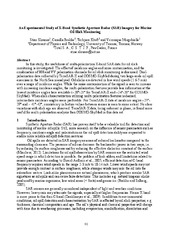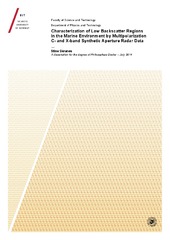| dc.contributor.advisor | Brekke, Camilla | |
| dc.contributor.author | Skrunes, Stine | |
| dc.date.accessioned | 2015-01-09T07:48:31Z | |
| dc.date.available | 2015-01-09T07:48:31Z | |
| dc.date.issued | 2014-10-10 | |
| dc.description.abstract | The focus of this thesis is the application of multipolarization SAR data for characterization of marine oil spills and other low backscatter ocean phenomena. A variety of SAR descriptors are investigated for the purpose of discriminating between oil spills and look-alikes. The effects of various parameters on the imaging, including sensor frequency, imaging geometry and oil properties, are addressed. The analysis is performed on a unique data set collected during annual oil spill exercises in the North Sea.
Cross-polarization channels are found to be severely contaminated by noise, and only copolarization channels are used in this study. Coherent systems, in which the relative phase between polarization channels is preserved, are found preferable to sensors where only intensity information is useful. A number of dual-copolarization features are compared in terms of their discrimination ability. The two most promising features are selected and used as basis for image classification. The results show that the feature pair can distinguish between a simulated biogenic slick and mineral oil spills.
A comparison between C- and X-band data is conducted, including analysis of near coincident acquisitions by Radarsat-2 (C-band) and TerraSAR-X (X-band). Multipolarization features here show enhanced detection and characterization abilities in the Radarsat-2 data compared to TerraSAR-X data. No clear difference in terms of data quality is found. The presence of a non-Bragg scattering component in the data is revealed for both sensors. Some differences in the statistical and scattering properties are identified between the two sensors and among low backscatter regions of various origins.
A potential for using log-cumulants for discrimination between mineral oil spills and other marine low backscatter regions are demonstrated. This is shown for both Radarsat-2 and TerraSAR-X, and for both single-polarization and multipolarization data. The proposed method has a potential for classification of low backscatter ocean regions of unknown origin. | en |
| dc.description.doctoraltype | ph.d. | en |
| dc.description.popularabstract | Satellittbilder fra syntetisk apertur-radar (SAR) brukes i dag til å overvåke havområder og detektere oljesøl. En utfordring er å skille oljesøl fra naturlige fenomen som ser ut som oljesøl i SAR-bilder og gir falske deteksjoner. Målet med denne avhandlingen er å undersøke ulike parametere som kan beregnes fra SAR-bilder for å se hvilken informasjon som best kan brukes til å skille mellom faktiske oljesøl og andre fenomen. I avhandlingen ser jeg også på hvordan ulike parametere som frekvens, avbildningsgeometri og oljeegenskaper påvirker mulighetene for deteksjon og karakterisering av oljesøl. Studien er basert på data samlet inn under årlige oljevernøvelser i Nordsjøen.
Analysen gir økt kunnskap om hvilke datatyper og parametere som har best evne til å skille mellom ulike fenomen og som er mest pålitelige, og hvilke avbildningsforhold som er optimale. Basert på statistiske deskriptorer foreslår vi også en ny metode for å skille oljesøl fra andre fenomen. | en |
| dc.description.sponsorship | Total E&P Norge AS | en |
| dc.description | Papers II, III and IV are not available in Munin due to publisher's restrictions:<br> II: S. Skrunes, C. Brekke and T. Eltoft, "Characterization of Marine Surface Slicks by Radarsat-2 Multipolarization Features", IEEE Transactions on Geoscience and
Remote Sensing, vol. 52, no. 9, pp. 5302-5319, Sep. 2014. Available at <a href=http://dx.doi.org/10.1109/TGRS.2013.2287916>http://dx.doi.org/10.1109/TGRS.2013.2287916</a><br> III: S. Skrunes, C. Brekke, T. Eltoft and V. Kudryavtsev, "Comparing Coincident C- and X-band SAR Acquisitions of Marine Oil Spills", IEEE Transactions on Geoscience and Remote Sensing, Vol. 53, Issue. 4, April 2015. Available at <a href=http://dx.doi.org/10.1109/TGRS.2014.2351417>http://dx.doi.org/10.1109/TGRS.2014.2351417</a><br> IV: S. Skrunes, C. Brekke and A. P. Doulgeris, "Characterization of SAR Low Backscatter Ocean Features Using Log-Cumulants", IEEE Geoscience and Remote Sensing Letters, Vol. 12, Issue. 4, April 2015. Available at <a href=http://dx.doi.org/10.1109/LGRS.2014.2363688>http://dx.doi.org/10.1109/LGRS.2014.2363688</a> | en |
| dc.identifier.isbn | 978-82-8236-150-7 (trykt) og 978-82-8236-151-4 (pdf) | |
| dc.identifier.uri | https://hdl.handle.net/10037/7002 | |
| dc.identifier.urn | URN:NBN:no-uit_munin_6596 | |
| dc.language.iso | eng | en |
| dc.publisher | UiT Norges arktiske universitet | en |
| dc.publisher | UiT The Arctic University of Norway | en |
| dc.rights.accessRights | openAccess | |
| dc.rights.holder | Copyright 2014 The Author(s) | |
| dc.rights.uri | https://creativecommons.org/licenses/by-nc-sa/3.0 | en_US |
| dc.rights | Attribution-NonCommercial-ShareAlike 3.0 Unported (CC BY-NC-SA 3.0) | en_US |
| dc.subject | VDP::Matematikk og Naturvitenskap: 400::Fysikk: 430::Elektromagnetisme, akustikk, optikk: 434 | en |
| dc.subject | VDP::Mathematics and natural science: 400::Physics: 430::Electromagnetism, acoustics, optics: 434 | en |
| dc.subject | VDP::Teknologi: 500::Miljøteknologi: 610 | en |
| dc.subject | VDP::Technology: 500::Environmental engineering: 610 | en |
| dc.subject | VDP::Matematikk og Naturvitenskap: 400::Informasjons- og kommunikasjonsvitenskap: 420::Simulering, visualisering, signalbehandling, bildeanalyse: 429 | en |
| dc.subject | VDP::Mathematics and natural science: 400::Information and communication science: 420::Simulation, visualization, signal processing, image processing: 429 | en |
| dc.title | Characterization of Low Backscatter Regions in the Marine Environment by Multipolarization C- and X-band Synthetic Aperture Radar Data | en |
| dc.type | Doctoral thesis | en |
| dc.type | Doktorgradsavhandling | en |


 English
English norsk
norsk

